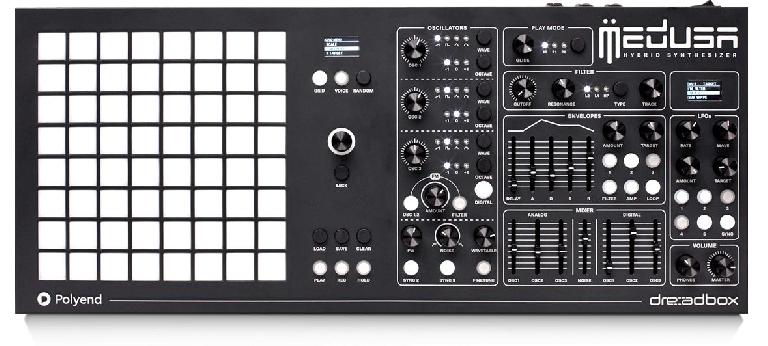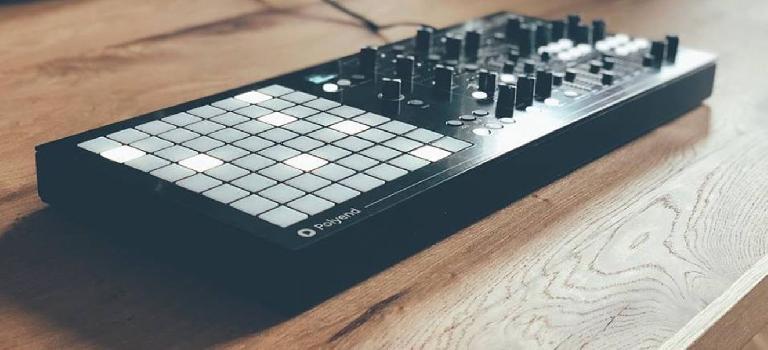Review: MEDUSA by PolyEnd and Dreadbox
Rounik Sethi on Aug 27, 2018 in Review | 0 comments
Medusa is an innovative new synth, the result of a collaboration between Dreadbox and PolyEnd. The core of what's new with Medusa is the GRID - a multi mode expressive interface that can be used as an instrument, a sequencer, a modulator, or any combination of the above.
Here's what Loopop has to say about his hands-on experience with Medusa:
Medusa is an innovative new synth, the result of a collaboration between Dreadbox and PolyEnd. The core of what's new with Medusa is the GRID - a multi-mode expressive interface that can be used as an instrument, a sequencer, a modulator, or any combination of the above.
Medusa combines Dreadbox's great sounding analog synth capabilities with PolyEnd's experience in making SEQ - its powerful and yet easy to use sequencer.
They call it a Hybrid Synth and it is indeed a combination of a few things - it has both analog and digital oscillators, it’s both a monophonic and polyphonic or paraphonic depending on your definition of those terms, and of course its main feature, the grid makes it a hybrid synth/controller that does things very differently than other synths.

Each grid pad can be programmed to have up to 6 notes, any combination of modulation parameters, or a mod and note combined. Pads on the grid can be played live, sequenced, or operated in combinations thereof.
On the synth side, Medusa has three analog oscillators and three digital oscillators, each with their strengths. The analog oscillators have FM, hard sync and a modifiable duty cycle for the square wave, enabling PWM. The digital oscillators have basic wavetable skills - with 20 included wavetables with up to 30 different waveforms in each table. Currently the motion between the waveforms doesn't include interpolation and you can't load your own wavetables, but PolyEnd have indicated that this capability may be added in the future.
Medusa's filter has three modes - 2 pole low pass, 4 pole low pass and high pass - all with resonance that doesn't impact the bottom end, which is always welcome.
On the modulation side, Medusa has 5 LFOs and 5 envelopes, and while initially that may seem excessive, it actually makes sense because each has just one assignable destination - simplicity's sake (two of the 5 envelopes are pre-assigned to the filter and VCA) - which is a great way to avoid a complex mod matrix. Medusa also goes the extra mile with its envelopes and LFOs - adding an initial delay stage and looping capabilities to the envelopes, and morphing wave-shapes to the LFO, which is a rather unique feature.
Medusa is a paraphonic synth with three play modes - monophonic aligns all the oscillators with one note as typical with mono synths, and modes P1 and P2 let you play three and six separate notes respectively. All the notes will share the same filter, and hence cannot be called truly polyphonic, but each gets their own VCA envelope, getting very close to sounding polyphonic.

Summary
In my communications with PolyEnd while creating this review, bugs were fixed quickly and it seemed like missing features were almost always a matter of prioritization rather than possibility. If I had to list my "cons" or feature wishlist it would be custom wavetables, wavetable interpolation, a random LFO, MPE support, pattern chaining and transposition of sequences.
On the "pros" side, it's always great to see innovation in synths, especially in terms of innovative and expressive control. The "grid"'s ability to combine sequencing and live playback with comprehensive note and timbre control brings to life a truly a new way to play synths.
Medusa is a very refreshing and interesting hat thrown into the synth ring and well worth taking a closer look.
Product page: https://www.dreadbox-fx.com/medusa/
Price: 999 Eur
Learn more about hardware sequencing and synthesis: https://ask.audio/academy?nleloc=new-release


 © 2024 Ask.Audio
A NonLinear Educating Company
© 2024 Ask.Audio
A NonLinear Educating Company
Discussion
Want to join the discussion?
Create an account or login to get started!